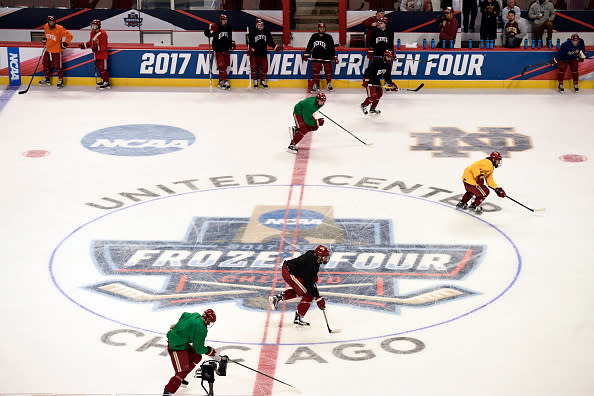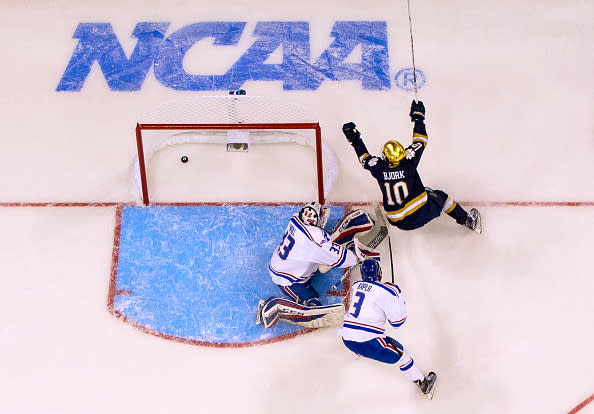NCAA Hockey 101: Previewing the Frozen Four matchups

It’s not all chalk in Chicago this week.
Sure, the top-seeded team is there. And the No. 2 seed is there. And so is the No. 3. But the No. 13 seed is in the mix, too, and they had the hardest possible path.
The Notre Dame Fighting Irish had a poor start and a whopper of a second half to qualify, even if they crashed out of the Hockey East tournament in the semifinals. But then they put down the No. 4 seeded Minnesota Golden Gophers in the first round of the NCAA tournament, and overcame their own personal boogeymen in No. 5 UMass Lowell. Now they face the University of Denver Pioneers, the best team in the country for the vast majority of the season, in the second of tonight’s national semifinals.
[Follow Puck Daddy on social media: Twitter | Instagram | Facebook | Tumblr]
In the other game, the hottest team in the country over the past three months plays the second-hottest team in the country.
We’re in for a wild night.
Let’s start with the in tonight’s early game:
No. 2 Minnesota-Duluth vs. No. 3 Harvard (6 p.m. ET, ESPN2)
The Bulldogs came out of what was arguably the toughest regional of the year, edging out high-scoring Ohio State in overtime then sneaking past super-skilled Boston University, also in OT. Meanwhile, Harvard had probably the easiest slate of any team to make it to the Frozen Four, winning a 3-0 game against Providence that was closer than the scoreline suggests (the Crimson were outshot 41-29) and then hanging on against a solid Air Force team, 3-2, surviving a late push.
I previously wrote about Harvard’s white-hot second half here, and the hot streak has only continued. Meanwhile, the only real stumbling Duluth suffered through this season came in mid-January, and I wrote about that here.
So collectively, you have two teams that have a combined one loss (it was Duluth’s) and four ties in 36 games since Jan. 19. They’ve outscored their opponents by 46 (Harvard) and 24 (Duluth) in that stretch.
These are two teams effectively operating at peak efficiency over two and a half months. Strong special teams, strong goaltending, solid offenses. Of course, Harvard is just doing everything better than everyone else, including scoring more than four goals per game, and that’s Duluth’s big concern right now.
“They’re quick,” UMD coach Scott Sandelin said during Frozen Four media day on Wednesday. “They transition well. They don’t give up the puck. They make plays. Their defense gets involved, especially guys like Fox, who’s a tremendous player back there, very elusive, smart. … Hopefully, we can do the same thing to them. I think, if we do that and they do that, it’s going to be a heck of a game. It’s going to be back and forth.”
Indeed, the fact that these are two of the higher-end offensive teams in the country — Harvard is ranked first in goals per game, while Duluth is ninth — is because they’re good at capitalizing on mistakes. Bad turnover? It’s in the back of the net. Bad line change? It’s in the back of the net. Give them a power play? They’re probably going to convert on it.
Both teams have heavily-used players at above a point a game (six for Harvard, only one for Duluth) but there are plenty of players on both teams — and at both the forward and defense positions — that can score on any given night.
(And here’s where we note that Harvard played a relatively weak slate this year while Duluth played one of the toughest in the country. Their strengths of schedule rank 21st and third, respectively. Harvard is clearly one of the best in the nation, but you have to take into account that they whaled on a lot of bad teams in a way that Duluth never got to.)
If hockey is a game of mistakes, as everyone always says, you have to remember that there’s no way to play a mistake-free game. Guys bobble pucks, refs miss calls, goalies give up rebounds, defensemen miss assignments. The point, then, is what Harvard did so well at regionals: Accept that making mistakes is going to happen, but try to force more than your opponent, and if you have a high enough skill threshold, you’re going to have a good shot to win any given game.
“Obviously, at this time of year, you look at it, these teams are all great defensively,” Harvard coach Ted Donato said. “You look at [UMD goalie] Hunter Miska has been sensational in that. So at this time of year, you expect to have to play in tight games, and while it’s great that offensively we’ve had a productive season, we know that we have to be prepared to win a 1-0 hockey game if that’s what comes at us. So I think we’re capable of playing some good defense as well.”
To that end, it’s worth noting that for the high-flying offenses both teams pack, their defensive quality is right there as well. The Crimson rank fourth in goals against per game, the Bulldogs ninth. Accounting for strength of schedule, you probably suggest they’re just about even in terms of quality.
They both got near-elite goaltending all year at a minimum; Miska is .919 for the season but has struggled of late, with only .891 in his last 10 games. Across the ice, Merrick Madsen is .922 for the year, but .937 in his last 10. He allowed just two goals on 80 shots last weekend.
If there’s a difference in the game, that’s what it probably boils down to: One goalie is playing some of his worst hockey of the year and winning anyway, while the other is getting tons of goal support and playing lights-out in net as well.
At this point in the year, it’s just hard to pick against a team that hasn’t lost since the Trump presidency began what-feels-like-a-thousand-years-ago. Then again, you can’t win forever, right? The good news if you’re Harvard is you only have to do it for two more games.
On to the late game, then…

No. 1 Denver vs. No. 13 Notre Dame (9:30 p.m. ET, ESPN2)
What’s interesting about saying Notre Dame is one of the hottest teams in the country since the start of February is that Denver is even hotter (you can read what I previously wrote about Denver right here) They’re 13-1-0, while the Irish are 9-2-2.
The only loss the Pioneers suffered during that time were to North Dakota, a roughly top-10 team in terms of overall quality, in the NCHC semis. It was a surprising result, to be sure, but not so surprising as to be shocking. The Pios were favored but North Dakota can beat anyone on any night.
Meanwhile, the only losses Notre Dame suffered were to Boston University (in a game that, if they’d won, they would have been the top seed in the Hockey East playoffs) and then UMass Lowell. These are two teams anyone would rationally put in the top six or eight in the nation. The ties were to Vermont (meh) and Providence (a tournament team that had a nice second-half stretch run).
And as with the early game, this one is shaping up to be a goaltending slugfest. While both teams have lines that can score by the bushel, they also have two of the very best goalies in the country in Notre Dame’s Cal Petersen (.929) and Denver’s Tanner Jaillet (.928).
What’s interesting is that these two teams played each other for a weekend series, and while you don’t want to draw too many conclusions from games you played 15 months ago, the fact that Petersen stopped 92 of 95 shots in a pair of ties was instructive.
And with two coaches who used to work together, and who are among the very best in the nation themselves, the gameplan is pretty clear to all involved: Like Steven Soderbergh in 2000, you gotta create traffic.
(Sorry.)
“It’s the same as any goaltender: take away his eyes,” Denver coach Jim Montgomery noted Wednesday. “Get to the net-front. There’s going to be rebounds if you take away his eyes. … We’re better than we were last year, and we’re scoring more than we were last year when we faced him.”
UMass Lowell did that masterfully in Notre Dame’s last last a few weeks ago, stinging Petersen and the Irish for five goals on 41 shots. They did not do that at the regional final in Manchester, and Petersen stopped 27 of 29 in an overtime win.
Indeed, Notre Dame came from behind in both games in last week’s regional.
“We know they have a good offense, but I’m very confident in the guys I have in front of me,” Petersen said. “I understand there’s going to be pressure action, but I think, as long as we can manage that and understand where their attacks come from, I think we’ll be real set. I think, like I said, confident with the guys that we have in front. Obviously, they’re a very good team. We’ll be looking for a little pushback too.”
Of course, to Montgomery’s point about Denver having improved, Notre Dame has as well. They have a better D corps overall and the talent on their top line is at an elite level. Meanwhile, the Pioneers don’t have the scoring punch from their top group that they did last year when the Pacific Rim Line bullied everyone in college hockey, but they have a few great forwards and the best defenseman in the country.
But they don’t have Anders Bjork. He was the Manchester regional MVP two weeks ago because he just flat-out took over a pair of games and probably played about 50 minutes between the two of them. He put 10 shots on goal (nine against Minnesota as he scored twice, but only one against Lowell, as he added three assists to his season tally), played in all situations, and generally bent the game to his will whenever he came over the boards.
[Join a Yahoo Daily Fantasy Hockey contest now]
Notre Dame coach Jeff Jackson’s stated philosophy when it comes to giving his best players big minutes — Petersen played all but a period this year and hasn’t missed a start since Jan. 31, 2015 — is that if you have the horses you might as well ride ’em and see how far they go.
This year, Bjork and Petersen got him all the way to Chicago behind a sterling second half. But Denver’s been doing it all year. Notre Dame might be the Cinderella team, but Cinderella’s biggest enemy was the passage of time. And the passage of time is inevitable. It cannot be circumvented.
But Denver got this far because it’s been this good literally since October. There’s no getting around that, either.
Ryan Lambert is a Puck Daddy columnist and occasionally covers the NCAA for College Hockey News. His email is here and his Twitter is here.
MORE FROM YAHOO HOCKEY:

 Yahoo Sports
Yahoo Sports 

